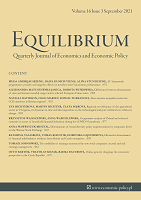Is redistributive policy of EU welfare state effective in tackling income inequality? A panel data analysis
Is redistributive policy of EU welfare state effective in tackling income inequality? A panel data analysis
Author(s): Anna Wildowicz-SzumarskaSubject(s): Economic policy, Welfare systems, EU-Accession / EU-DEvelopment, Socio-Economic Research
Published by: Instytut Badań Gospodarczych
Keywords: inequality; redistribution; taxes; social transfers;
Summary/Abstract: Research background: Income inequality has risen sharply since the 1990s, despite the increase in the average size of redistribution in countries representing different welfare state models. The problem of increasing income inequality is currently a challenge for the EU economies, not only with well-established liberal traditions, but also with conservative and social-democratic ones. Therefore, it is worth conducting research on the redistributive effects of fiscal policy. Purpose of the article: The article aims to show the redistributive effects of fiscal policy, paying particular attention to the most characteristic trends in redistribution, which are responsible for the growing income inequality. An overview of the fiscal instruments mainly personal income tax and benefit systems along with an empirical research on their potential impact on income inequality, allows for conclusions to be drawn about the effectiveness of redistributive policy in the EU countries. Methods: Both descriptive analysis and panel data analysis is implemented to examine the effectiveness of redistributive policy in tackling income inequality in the EU'28 countries in years 2005-2017. Findings & value added: Based on the panel analysis, it has been found that social transfers were much more effective than direct taxes in combating income inequality. In addition, the largest increase in income inequality as previously assumed was observed in the liberal welfare states, while the smallest in the social democratic welfare states. The empirical analysis extends the existing knowledge on main weaknesses of fiscal welfare state, indicating the required changes that may improve both its equity and efficiency.
Journal: Equilibrium. Quarterly Journal of Economics and Economic Policy
- Issue Year: 17/2022
- Issue No: 1
- Page Range: 81-101
- Page Count: 21
- Language: English

